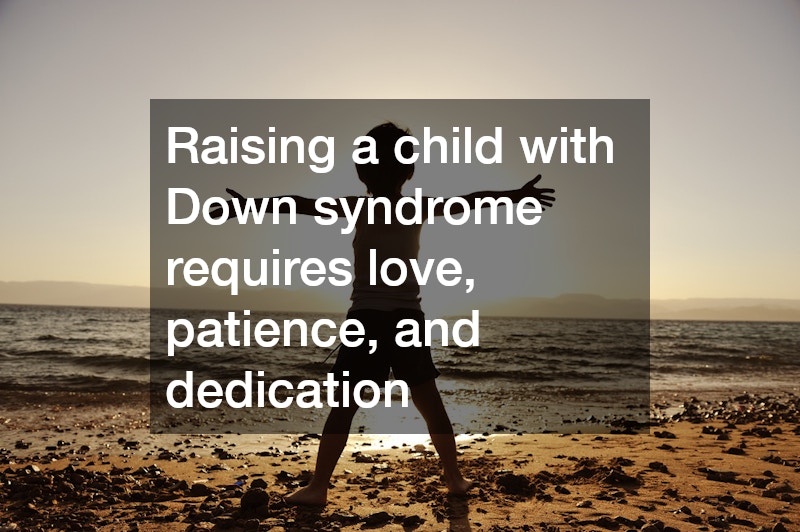Raising a child with Down syndrome is a unique journey filled with both challenges and rewarding moments. Understanding the intricacies of this genetic condition can help parents, guardians, and loved ones provide the best support possible for their child’s development and well-being. Down syndrome occurs when an individual has a full or partial extra copy of chromosome 21, which affects physical and cognitive development. This additional genetic material can influence a range of characteristics, including intellectual abilities, speech development, motor skills, and physical features.
However, with the right approach and resources, children with Down syndrome can lead fulfilling lives and reach their full potential. It is important to remember that every child with Down syndrome is unique, with their own strengths, challenges, and personality. Early intervention, access to specialized education, and ongoing medical care are essential in supporting their growth. In this blog post, we explore essential facts and considerations to keep in mind when raising a child with Down syndrome, offering guidance and hope for families navigating this special journey.
Understanding Growth and Development
Children with Down syndrome experience physical and intellectual development at a slower pace than their peers. Each child is unique and will develop skills on their own timeline. While milestones such as walking and talking may occur later, with patience and hard work, these milestones can be achieved. Early intervention programs, including speech, occupational, and physical therapies, play a crucial role in supporting development. Parents are encouraged to communicate regularly with healthcare professionals to monitor progress and adapt strategies as needed.
The Importance of Inclusion and Education
Education is a key component in the growth and development of a child with Down syndrome. Many children benefit from inclusive education, where they learn alongside their typically developing peers. This integration promotes social skills, communication, and mutual understanding. Individualized Education Programs (IEPs) are essential tools in accommodating the unique needs of students with Down syndrome and ensuring they receive appropriate educational support. Furthermore, educators play a significant role in fostering an inclusive environment that encourages learning and interaction for all students.
Managing Health and Medical Needs
Children with Down syndrome can have a higher prevalence of certain medical issues, such as congenital heart defects, respiratory conditions, and thyroid disorders. Regular medical check-ups and early detection of health concerns are vital in managing these conditions effectively. Partnering with pediatricians and specialists with experience in Down syndrome care can greatly benefit the health outcomes of the child. Vaccinations, along with a balanced diet and regular physical activity, are important aspects of maintaining overall health. Parents should also be attentive to potential signs of sleep apnea, vision and hearing impairments, which may require interventions.
Building a Strong Support Network
The journey of raising a child with Down syndrome is best traveled with a supportive community. Connecting with other families going through similar experiences can be incredibly beneficial. Support groups, both in-person and online, offer a platform to share challenges, solutions, and triumphs. Participating in workshops and seminars on Down syndrome education can empower parents with knowledge and encourage advocacy. It’s important for families to lean on extended family members, friends, and professionals for additional support as needed.
Fostering Independence and Life Skills
Promoting independence is an essential aspect of raising a child with Down syndrome. Parents should set realistic goals and encourage their children to engage in age-appropriate tasks. Skills such as dressing, personal hygiene, and simple chores can foster a sense of capability and responsibility. Celebrating small achievements boosts confidence and motivates continued learning. As children grow, providing opportunities for vocational training and finding hobbies they enjoy can further support their transition to adulthood. Life skills classes and community programs can also provide practical experience in a supportive environment.
Raising a child with Down syndrome requires love, patience, and dedication, but it also brings immense joy and fulfillment to families. By understanding and addressing the unique needs and abilities of their child, parents can provide a nurturing environment that helps their child thrive. With inclusive education, strong health management, and community support, children with Down syndrome can lead meaningful and enriched lives. Celebrating every milestone, no matter how small, becomes a source of pride and a reminder of the child’s resilience and determination. Involvement in support groups, therapy programs, and advocacy networks can also empower families, allowing them to connect with others who share similar experiences and gain access to valuable resources. It’s essential to promote acceptance and raise awareness in schools, workplaces, and communities to ensure equal opportunities and eliminate stigma. Ultimately, each child is a valued member of a diverse society, contributing their own perspectives and strengths. As we continue to learn and advocate, we pave the way for a more inclusive, compassionate, and understanding world for all.
.


